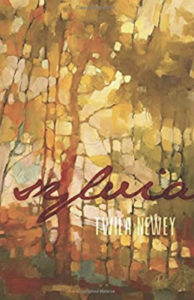 Twila Newey introduces her debut novel, Sylvia, published this month by BCC Press.
Twila Newey introduces her debut novel, Sylvia, published this month by BCC Press.
Synopsis: Four Mormon sisters wake to the news of their mother Sylvia’s unexpected death. Over the next seven days they gather at the family cabin and find themselves circling a visceral hole left in the family landscape. Time troubled by loss collapses past and present. Mary, revisits her role as protector, triggering a painful memory she’s carried since childhood. Roxcy finds herself at a personal edge, unsure how to keep private the fissures that threaten to fracture her perfect Mormon world. Eve’s long struggle with infertility reached a fever and broke without her sisters ever knowing. And Anna’s shattered life plan, especially her recent, blatant un-Mormonness, pushes already tenuous emotions to the brink.
“I believe that one can only begin to advance along the path of discovery, the discovery of writing or anything else, from mourning and in the reparation of mourning. In the beginning the gesture of writing is linked to the experience of disappearance, to the feeling of having lost the key to world, of having been thrown outside. Of having suddenly acquired the precious sense of the rare, of the mortal. Of having urgently to regain the entrance, the breath, to keep the trace.”
-Hélène Cixous
I began writing Sylvia when I was still active in the Mormon faith and completed after I’d finished practicing—a story born from mourning, from being thrown outside the stories that held me for the first half of my life. Sylvia is kind of interrogative love letter to Mormon womanhood, which is defined by motherhood. In the beginning I wrote in snatches of time, short scenes, feeling my way back into language after years devoted, primarily, to pregnancy, nursing, toddlers, and trying very hard to be a good Mormon mom to my four kids. Then two hours of preschool for my youngest lengthened to a half day, then a full day. As my writing hours grew, my kids learned to pour themselves cereal, clean their own bathroom, and disappear into books. I learned to live with a mess and work with interruption. I did have occasional weekends away to collage together the various scenes I’d written and rewritten. It feels like I rearranged, cut, and rewrote each scene hundreds of times. Slowly, connecting threads emerged, the sisters’ voices and stories clarified. Each working their way toward each other through the loss of their mom. So, the book itself became the landscape in which I began to unweave, through their four different perspectives, the threads of stories about the ideal woman and mother, that were wrapped around me, the comfort and the constriction, in that winding. I didn’t know at the time but I was, literally, writing myself out of the narrative of one true anything, one way to be good, one way to grieve, one way to mother, one way to live—stepping off the straight and narrow and laying down in the tangle of roots, of relationship, of interconnection, which is the only place where I feel like I’ve encountered god. An aspen grove sat waiting—the perfect metaphor.
It was a tender thing to return to the mountain groves, the quiet suburban streets, and congregation/ward of my childhood in the process of writing this book. It was a tender thing to have these women’s voices, albeit fictional, hold that time and place in my head and heart for seven years. Ultimately, I think I wrote toward a lot of questions for which I still have no clear answers. So, it also felt right to not tie anything too neatly, to allow for gaps, for loose threads. And as much as this story troubles and interrogates the ideal mother myth, I hope it is also a universal story about how humans traverse loss to create and recreate connection.
I also want to acknowledge the limits of the story I wrote and the questions it asks. Sylvia takes place in a very small, white, secure, world. There are no single women or lesbian women represented and I’m truly sorry if my own insecurities about writing too far outside my experience alienates or is hurtful to any woman. It’s also important to acknowledge, in the larger world mothers and children face, and have always faced, racism, financial insecurity, homelessness, abuse, and the impossible choices those realities create. How deep is my personal commitment to interconnection if my cupboards are full of food and mothers, one town or one house away, are agonizing because they don’t have enough food, clothing, shelter, good schools, a supportive partner, and/or community support to care for themselves and their children? All of which I do have. All of which are necessary for me to write.
And now here we are in this collective moment of deep loss and uncertainty—having lost the key to the world…having suddenly acquired the precious sense of the rare, of the mortal. I hope and pray we can build a softer, more pliable, human world. May we help each other regain the entrance, the breath. May we help each other keep the trace.
With thanks to Jenny Champoux, whose thoughtful reading of Sylvia, and her email sharing those thoughts, helped me write this and to BCC Press for publishing this story.
 Twila Newey grew up in Provo, Utah. She earned a B.A. in English from Brigham Young University and an M.F.A. in Writing and Poetics from the Jack Kerouac School of Disembodied Poetics at Naropa University in Boulder, Colorado. She was a finalist for The 2019 Coniston Prize at Radar Poetry and received honorable mention in the 2019 Juxtaprose Poetry Contest. She is also a poetry reader for Psaltry & Lyre. Twila lives in the San Francisco Bay area with her husband and four children.
Twila Newey grew up in Provo, Utah. She earned a B.A. in English from Brigham Young University and an M.F.A. in Writing and Poetics from the Jack Kerouac School of Disembodied Poetics at Naropa University in Boulder, Colorado. She was a finalist for The 2019 Coniston Prize at Radar Poetry and received honorable mention in the 2019 Juxtaprose Poetry Contest. She is also a poetry reader for Psaltry & Lyre. Twila lives in the San Francisco Bay area with her husband and four children.
